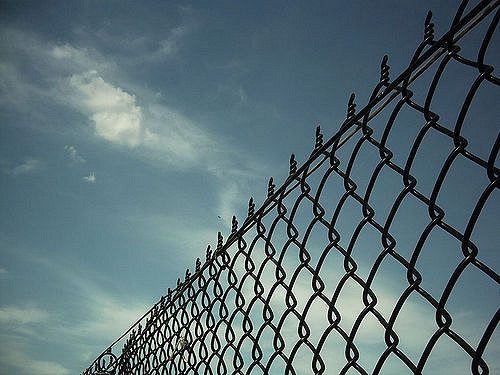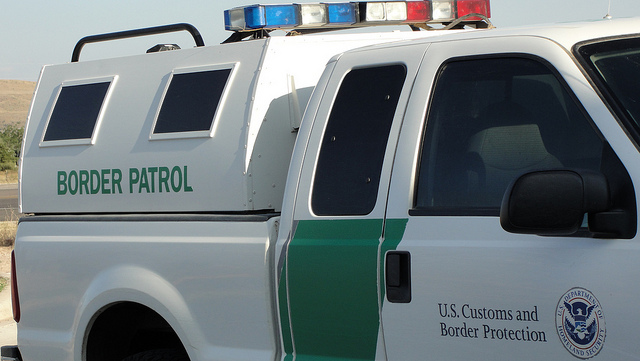This News Channel's Representation of Detention Centers Is Dangerously Wrong
By:
"Fox and Friends" hosts Brian Kilmeade and Ainsley Earhardt alleged Friday morning that the life of an immigrant detained in an American prison was "easy" and a "party." In their story covering President Donald Trump's plan to roll back prisoner protections for detained immigrants, Kilmeade spoke of the current protections as if prison was a privilege.
"Get this: They’re enjoying seven hours of outdoor activity. Who gets that anymore?” he said, apparently referring to the mandatory seven hours of outdoor time afforded ICE prisoners per week. (Other prisoners only get two). Kilmeade continued, "Fresh sheets ― I don’t get that. No need to learn English. I was born with that. But the Trump administration vowing a new plan to cut back on perks in their immigration crackdown, saying, expect a far less detailed set of regulations ― maybe even dirty sheets ― including no translation services, so learn English.”
It's worth noting that English is not the official language of the United States, and never has been.
 Tony Webster - flickr.com
Tony Webster - flickr.com
Co-host Earhardt added, "That's the easy life of an illegal immigrant inside American jails. But now, the Trump administration says the party is over.”
Under the current rules, reports the New York Times, jails must:
"Notify immigration officials if a detainee spends two weeks or longer in solitary confinement. Check on suicidal inmates every 15 minutes, and evaluate their mental health every day. Inform detainees, in languages they can understand, how to obtain medical care. In disciplinary hearings, provide a staff member who can advocate in English on the detainee’s behalf."
According to the Times, these requirements were greatly expanded over the past few years, partly in response to reports of gross mistreatment of ICE prisoners.
But those requirements, along with others, may soon be on the chopping block.
Now that the Trump crackdown on undocumented immigrants is fully underway, the administration needs a place to put all the detained. The administration is hoping that by relaxing the rules regarding ICE detainees, more sheriffs and local law enforcement will be enticed to take on the additional prisoners. It's worth noting that many law enforcement officials believe the restrictions to be too generous to detainees right now.
 JoshuaDavisPhotography - flickr.com
JoshuaDavisPhotography - flickr.com
“Jail is jail,” Sheriff Richard K. Jones of Butler County, Ohio told the Times, “It’s fair and it’s humane, but we don’t put chocolates on the pillows.”
However, the ACLU has noted extensive human rights abuses suffered by detainees.
"The growth in detention has resulted in often horrible conditions of confinement, such as grossly inadequate health care, physical and sexual abuse, overcrowding, discrimination, and racism. NGOs frequently receive widespread complaints from detainees and their loved ones regarding problems such as lack of access to necessary medications for persons with chronic illnesses; shackling; use of segregation or tasers for disciplinary purposes; inability to visit with family members and problems with access to telephones."
As Sebastian Murdock jokes in The Huffington Post, "These two [hosts] must be attending some pretty terrible parties."
.jpg?auto=format&crop=faces&fit=crop&q=60&w=736&ixlib=js-1.1.0) PROFibonacci Blue - flickr.com
PROFibonacci Blue - flickr.com
And increasingly, ICE detainees are held in privately-owned prisons.
According to a 2016 report from the ACLU, by summer of 2016, the ICE detainee population had ballooned to over 37,000 — 73 perfect of these prisoners were housed in privately-owned prisons. According to the report, these prisons have considerably worse human rights records than their publicly owned counterparts.
"Private prison companies, which are incentivized to cut medical staffing and deny care to maximize shareholder return, have a particularly grisly track record," the report states.
In December 2016, in a non-binding vote the Department of Homeland Security rejected a DHS advisory committee's suggestion to continue the use of private prisons for ICE detainees. There were 14 recommendations made following former Homeland Security Secretary Jeh Johnson asked for a review in August, "including the need for enhanced oversight, more resources, expanded health care and to negotiate with county jails, which often hold detainees, to improve conditions," according to the investigative news organization Reveal. The vote accepted many of the recommendations. (The final decision is up to the Homeland Security Secretary.)
Some are anticipating that the Trump administration will be a boon for private prisons, given that the administration's plans to increase the number of ICE deportation officers, and the expansion of who is considered high priority for deportation. From NPR:
"As a result, many anticipate that an expansion of DHS operations will be profitable for private prison companies. John notes that for-profit detention at 'all levels' has been sharply criticized. Complaints include poor living conditions, understaffing, security risks, mismanagement and poor medical care."
Private prisons also have an obvious incentive to keep adding prisoners — the more people they can incarcerate, the more money they make for shareholders. The private prison lobby has, unsurprisingly, donated a lot of money to support ramping up border protections and escalating the War on Drugs. After all, if prisons are the product, more prisoners means more demand for their services.
 Frank Heinz - flickr.com
Frank Heinz - flickr.com
According to the Washington Post, "Private prison contracts often require the government to keep the correctional facilities and immigration detention centers full, forcing communities to continuously funnel people into the prison system, even if actual crime rates are falling." Immigration enforcement is one big piece of their bottom line.
